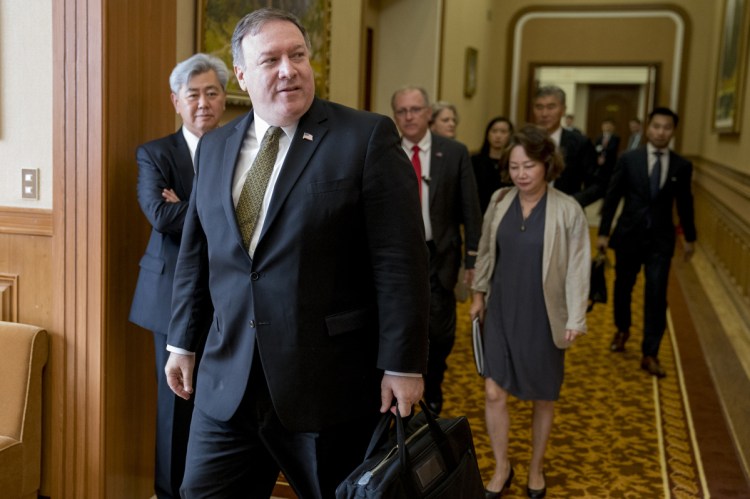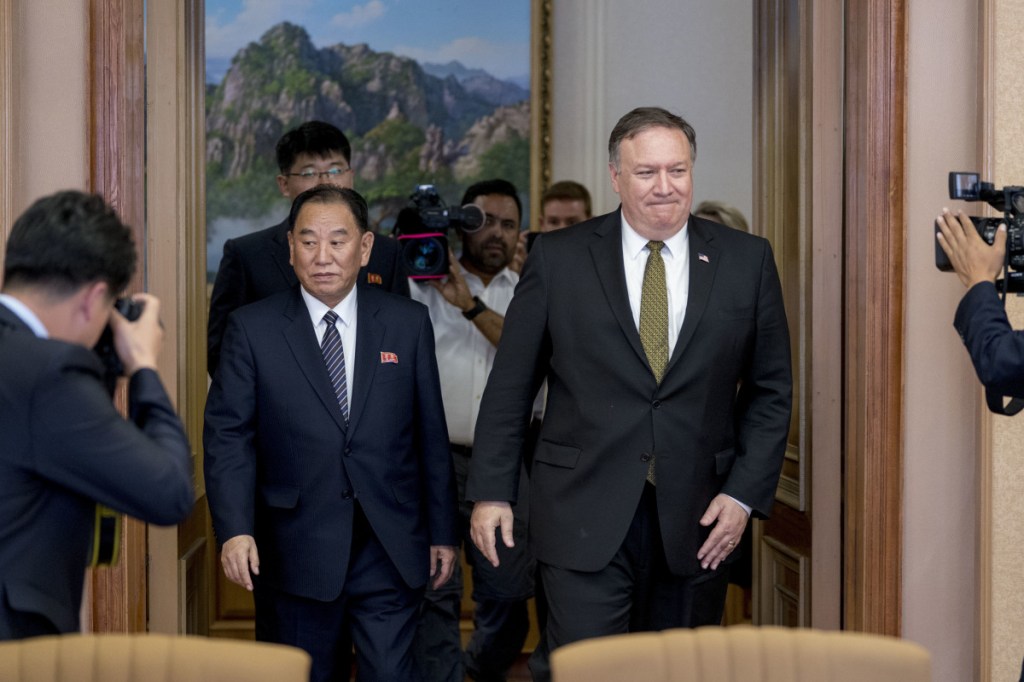TOKYO — In a sharp signal that denuclearization negotiations with North Korea will be drawn out and difficult, Pyongyang on Saturday lambasted the U.S. stance as regrettable, gangster-like and cancerous, directly contradicting Secretary of State Mike Pompeo’s rosy assessment that his two days of talks had been “productive.”
A harsh statement from an unnamed spokesman for the Foreign Ministry was carried on the state-run Korea Central News Agency just hours after Pompeo left Pyongyang on Saturday and told reporters that significant progress had been made “in every element” of what he characterized as “good-faith negotiations.” Pyongyang crushed that appraisal, saying the United States had betrayed the spirit of the June 12 Singapore summit between President Trump and North Korean leader Kim Jong Un.
“The U.S. side came up only with its unilateral and gangster-like demand for denuclearization,” the statement said.

U.S. Secretary of State Mike Pompeo, right, and Kim Yong Chol, left, in Pyongyang, North Korea, on Saturday.
“The issues the U.S. side insisted on during the talks were the same cancerous ones that the past U.S. administrations had insisted on,” it added.
Though North Korea still has faith in Trump, the statement said, it warned that the U.S. approach had brought the two countries to a “dangerous” stage that could “rattle our willingness for denuclearization.”
It was unclear whether the North Korean statement represented potential doom for meaningful negotiations, as some analysts believed, or was just Pyongyang’s standard negotiating style, as others asserted. It exposed the fragility of discussions at the center of Trump’s foreign policy and raised questions about Pyongyang’s intentions.
At the very least, the statement was an embarrassment for Pompeo, who has repeatedly said Kim has assured him personally that North Korea is willing to give up its nuclear weapons. But Pompeo did not meet with the North Korean leader on this trip, as he did on two previous visits and as some administration officials had hoped he would this time as well.
In its return to pre-Singapore bellicose rhetoric, the ministry’s statement also served as a rebuttal to Trump, who has declared the North Korean nuclear threat over and done with, even though nothing in the joint declaration signed in Singapore was definitive. The two countries do not even agree on what the concept of denuclearization means.
Some analysts saw no reason for alarm in Pyongyang’s downbeat version of events, considering it a routine North Korean negotiating tactic rather than a full-blown retreat from Pyongyang’s seeming commitments.
“They’re upping the ante for what they want, and downplaying what we want,” said Bill Richardson, who has negotiated with North Korea for prisoner releases. “This is typical. They’re very skilled at sending messages. And their message is that this negotiation is not going to be easy. And it’s going to be very costly. So you’d better be prepared to deliver.”
But Evans Revere, a former U.S. diplomat with a long history of negotiating with North Korea, said it was evident that the talks in Pyongyang had not gone well — and that it appears North Korea may have no intention of actually denuclearizing in the way the United States would want.
“Pompeo appears to have presented the North Koreans with some demands and requirements for real moves toward denuclearization, as opposed to the symbolic steps and empty language Pyongyang has been using so far. He deserves credit for doing so,” Revere wrote in an email.
“But in doing so, he has elicited North Korean ire, and he has now seen the reality of North Korea’s game plan and intentions that many of us have been describing for some time,” Revere added. “Welcome to our world, Mr. Secretary.”
Send questions/comments to the editors.




Success. Please wait for the page to reload. If the page does not reload within 5 seconds, please refresh the page.
Enter your email and password to access comments.
Hi, to comment on stories you must . This profile is in addition to your subscription and website login.
Already have a commenting profile? .
Invalid username/password.
Please check your email to confirm and complete your registration.
Only subscribers are eligible to post comments. Please subscribe or login first for digital access. Here’s why.
Use the form below to reset your password. When you've submitted your account email, we will send an email with a reset code.